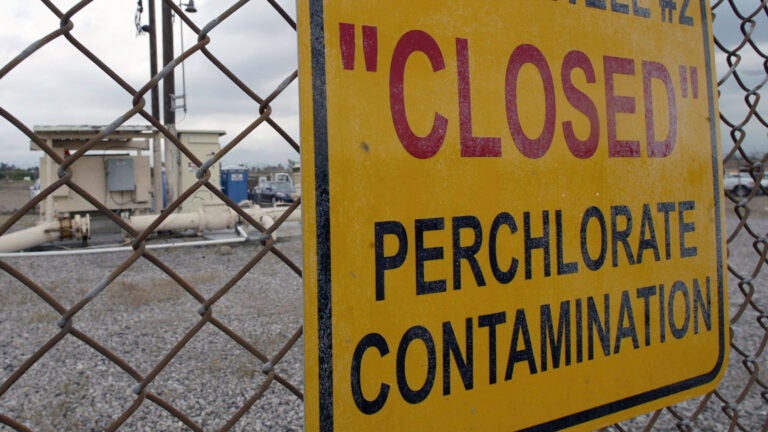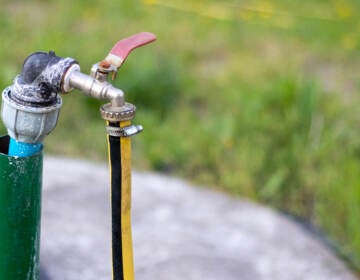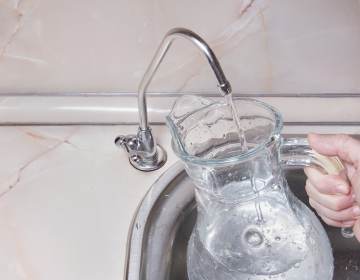Renewed calls for N.J. limit on toxic chemical as EPA reportedly rejects national regulation
Feds reversed an earlier plan to set a national standard for the toxic chemical, citing tough measures in two states.

In this March 28, 2005 file photo a sign posted outside a water well indicates perchlorate contamination at a site in Rialto, Calif. (AP Photo/Ric Francis)
This article originally appeared on NJ Spotlight.
___
New Jersey policymakers are facing renewed pressure to regulate a chemical that is linked to thyroid and fetal development problems, following the federal government’s reported decision not to set a national health standard.
According to two published reports last week, the Environmental Protection Agency will say there’s no need to regulate perchlorate, a component of rocket fuel, despite the agency’s earlier conclusion that the chemical is a threat to public health, and in apparent defiance of a court order directing the agency to impose a limit on its concentration in drinking water.
In response to the reports, the EPA said it has not reached a final decision on whether to regulate perchlorate, which is both man-made and naturally occurring in some areas. But it said levels in drinking water have declined since the agency decided in 2011 to set a limit, on the basis that 4% of public water systems, serving as many as 16 million people, may contain the chemical.
In a statement, EPA said: “The agency has not yet made a final decision and any information that is shared or reported now would be premature, inappropriate and would be prejudging the formal process.”
The agency said on Friday it will shortly send its “final action” on perchlorate to the Office of Management and Budget for interagency review.
‘Not in the public interest’
The New York Times quoted two unnamed EPA staffers as saying that the agency has decided to recommend that it’s “not in the public interest” to regulate the chemical. E&E News, a service that covers energy and the environment, also reported the decision, citing “multiple” unnamed sources.
Factors driving the reduction include a cleanup of 60 Superfund sites containing perchlorate; remediation of groundwater near the Colorado River in Nevada, and the effect of state regulations in Massachusetts and California, EPA said, in an information sheet.
In New Jersey, the chemical is subject to a health limit of 5 micrograms per liter in groundwater but remains unregulated in drinking water despite a state Department of Environmental Protection proposal to do so in 2009.
The state agency then called perchlorate a “chemical of concern” because it can cause disturbances of the thyroid function by inhibiting the absorption of iodine. Pregnant women and infants are at particular risk, the department said, because hypothyroidism can have “serious consequences” for brain development.

Get daily updates from WHYY News!
Testing recommended
DEP’s proposal was based on a recommendation four years earlier by the Drinking Water Quality Institute (DWQI), an advisory panel of state scientists and water company executives, to set a maximum contaminant limit of 5 micrograms per liter for the chemical in drinking water. The proposal expired in 2010 without action by the DEP; if it had been finalized, the regulation would have required water suppliers to test for contamination at that level, and treat for it if necessary.
Tests of public water systems and private wells between 2003 and 2005 found perchlorate in groundwater in 10 of New Jersey’s 21 counties, the DEP said. The highest level was 253 micrograms per liter, or about 50 times the recommended level, near a military base.
New Jersey’s proposed level was close to those implemented by California and Massachusetts. In California, which set a maximum contaminant limit of 6 micrograms per liter in 2007, perchlorate contamination accounted for about 60% of the cases detected nationally by the EPA in the early 2000s, the federal agency said. By 2019, only one California water system violated the state standard. In Massachusetts, which set a limit of 2 micrograms per liter in 2006, there are currently no systems exceeding that limit, the EPA said.
Last year, the EPA proposed a limit of 56 micrograms per liter, or about 11 times higher than the level New Jersey would have set if its proposal hadn’t expired, as required if a regulation is not adopted within a year.
Jeff Tittel, director of the New Jersey Sierra Club, said the state’s proposal was killed by the Christie administration, and has yet to be revived by the Murphy administration.
‘Waiting for a decade’
“We have been waiting for a decade for the DEP to adopt a new standard for perchlorate, but the Murphy administration has not moved forward,” Tittel said.
Bob Martin, DEP commissioner under Gov. Chris Christie, decided not to regulate the chemical because he wanted to wait for the federal government under the Obama administration to set a national standard, Tittel said. “Now here we are, 10 years later, and there is no federal standard.”
It doesn’t help that the DWQI hasn’t met publicly for two years, Tittel said. A state government source denied that the institute is avoiding recommendations on perchlorate or any other chemical but said its recent absence from public view reflects a heavy workload and limited staffing.
Environmental contamination with perchlorate can occur if it leaks during the manufacturing or dismantling of rockets, but not as a result of rocket firing because the chemical is consumed by the intense heat of a launch, according to the federal Agency for Toxic Substances and Disease Registry (ATSDR).
Other human-made sources include roadside safety flares and fireworks, as an impurity in bleach, and in fertilizer imported from Chile, where the chemical occurs naturally, the ATSDR said. It’s also found naturally in the environment in some parts of the U.S. Southwest, the agency said.
In 2016, a federal court approved an agreement between the EPA and the Natural Resources Defense Council, which had sued it to force a perchlorate regulation. The agreement required EPA to finalize a standard by December 2019, a deadline that was extended to June this year.
State Sen. Bob Smith (D-Middlesex), chair of the Environment and Energy Committee, said the chemical “probably” should be regulated by New Jersey. “Learning what the EPA is not doing, it probably is time for New Jersey to act,” he said.
He said the EPA’s reported decision not to set a standard was consistent with many attacks on environmental protection by the Trump administration.
“You can almost start with the presumption that if the Trump administration is doing it, it’s bad for the environment and bad for human health,” Smith said. “They put the barbarians in charge of the EPA, and they’re performing as shamelessly as the CDC and all the other governmental agencies.”
WHYY is your source for fact-based, in-depth journalism and information. As a nonprofit organization, we rely on financial support from readers like you. Please give today.






